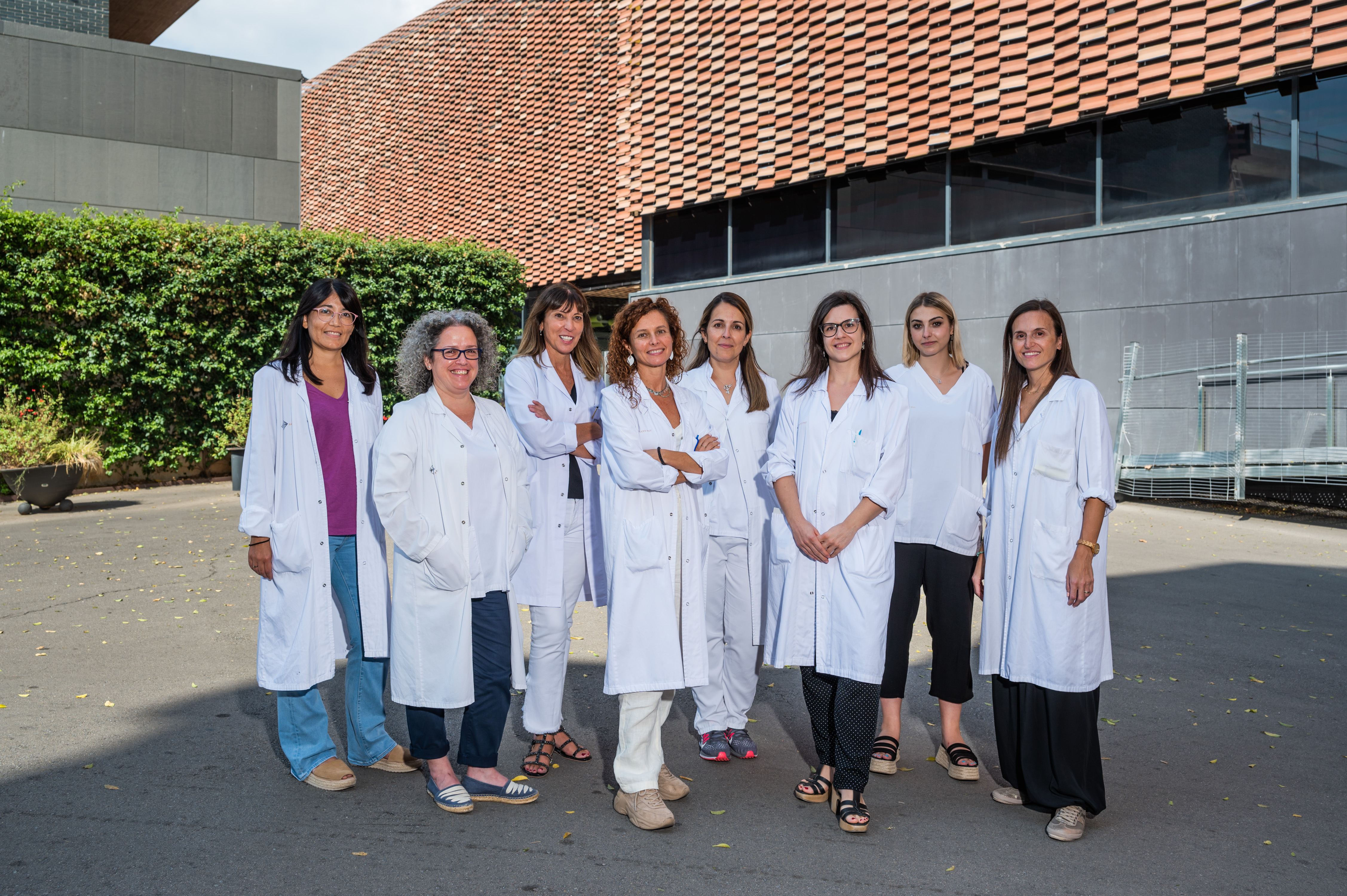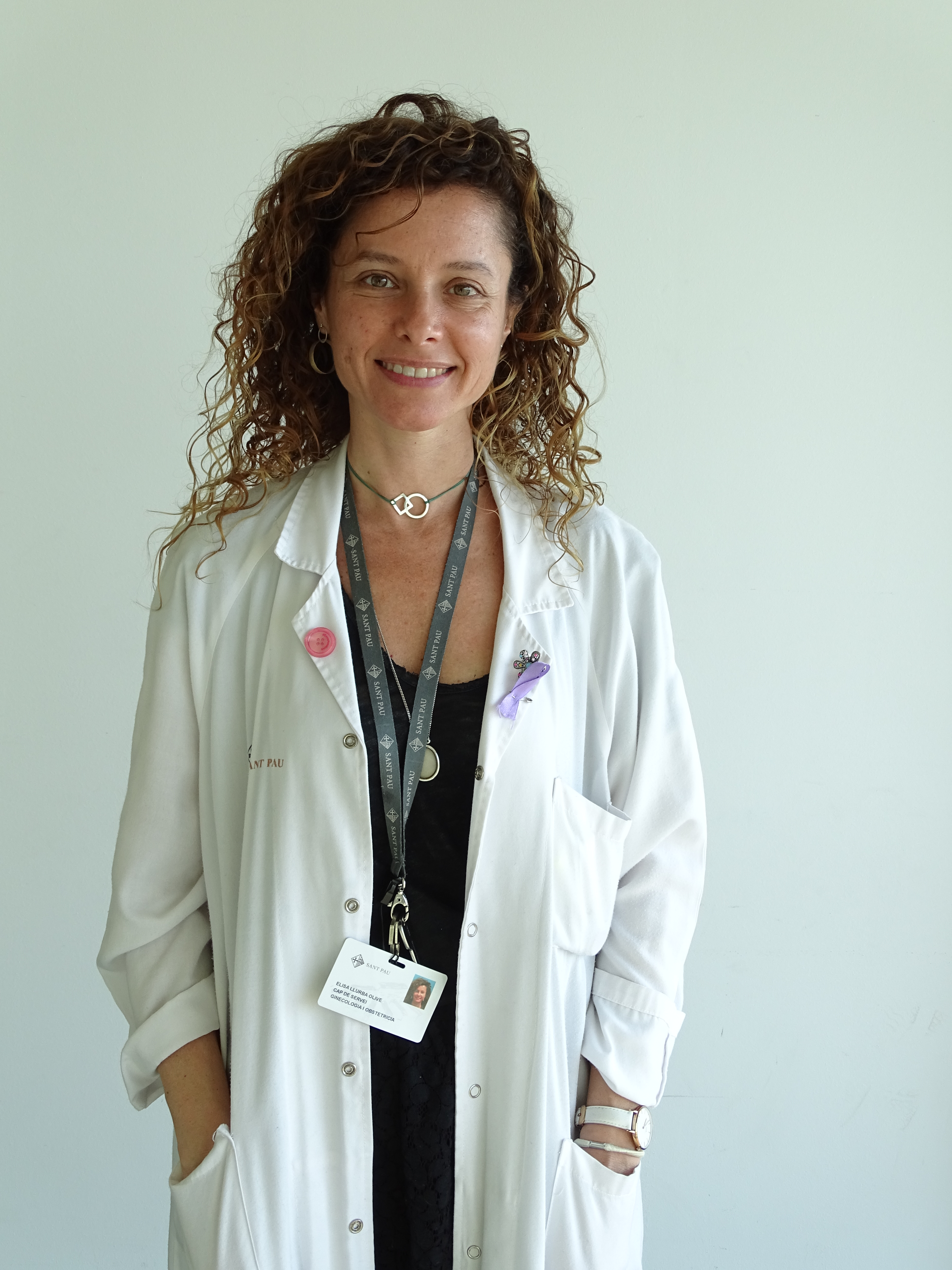

The Women and Perinatal Health Research Group led by Dr. Elisa Llurba, director of the Hospital’s Gynecology and Obstetrics Service, is focused on the study of diseases derived from placental insufficiency, growth restriction and alterations of the fetal heart and neurodevelopment. The group coordinator has an outstanding clinical research career as a leader and active member of a clinical and basic research group.
It should be noted her participation in the Redes de Investigación Cooperativa Orientadas a Resultados en Salud (RICORS) as the principal investigator of the Sant Pau group, in the network entitled “Primary care interventions to prevent maternal and child chronic diseases of perinatal and e developmental origin (RICORS-SAMID)” (reference RD21/0012/0001, Instituto de Salud Carlos III)”, after previous research iniciated in RETICS network “Salud Materno-infantil y del Desarrollo” (SAMID, reference RD16/0022/0015). This multidisciplinary group is composed by experts in maternal and child health: obstetricians, gynecologists, neonatologists, pediatric uciologists, nephrologists, and biologists, who ensure the achievement of the group’s research objectives.
Placental insufficiency.
International leading group in the inclusion of angiogenic factors in the clinical management of patients with placental insufficiency, publication of clinical guidelines, and multicenter studies related to the prediction and prevention of preeclampsia and its maternal and fetal consequences at the cardiovascular level:
Congenital Heart Disease (CHD).
• Research on the implication of the placenta in the development of congenital heart disease. The group has reported, for the first time in humans, the involvement of angiogenic factors in the development of the fetal heart.
• Implication of angiogenic factors in neurodevelopmental complications in children with CHD. Coordinated national project (PI13/01449).
Impact of environmental exposure to pollutants on pregnancy and fetal programming.
Participation in the BISC project “Barcelona Life Study Cohort” in collaboration with ISGlobal and Sant Joan de Déu Hospital. Internationally funded projects: 1) “Pre-natal exposure to urban AIR pollution and pre- and post-Natal Brain development (AIR-NB)”, European Research Council (ERC), Horizon 2020, announcement ERC-2017-ADG; 2) “Traffic-related air pollution and birth weight: the roles of noise, placental function, Green space, physical activity, and socioeconomic status (FRONTIER)”, The Health Effects Institute (HEI), 17-1 Assessing Adverse Health Effects of Exposure to Traffic-Related Air Pollution, Noise, and Their Interactions With Socio-Economic Status.
Improvement of assisted reproduction treatments (ART).
Evaluation of the impact of different interventions in an infertile population before in vitro fertilization (IVF), and evaluation of the improvement in the live birth rate, as well as the incidence of cardiovascular programming and adverse perinatal outcomes. (PI20/01504).
COVID-19 and gestation.
Evaluation of the impact of SARS-Cov-2 infection on maternal health, placental function, and pregnancy and neonatal outcomes. The group participates in several multicenter studies:
Innovative methods in delivery care.
• “Evaluación de la implementación de un método mecánica de inducción al parto en los resultados obstétricos, perinatales y en la experiencia de la paciente” INDOVA Study.
• “Evaluación de circuitos asistenciales para determinar aspectos de mejora de la experiencia de la usuaria y sus familias en la atención al parto y puerperio” Pro-Family Study.
To study novel placental biomarkers in the diagnosis and prognosis of preeclampsia (PE) and intrauterine growth restriction (IUGR) to generate future hypotheses for target prevention and therapeutic interventions in these diseases.
To determine the usefulness of novel placental biomarkers (sFlt-1/PlGF ratio) in the diagnosis and prognosis of preeclampsia (PE) to change polices and improve maternal and neonatal health.
To study novel maternal cardiovascular risk biomarkers after placental insufficiency and to explore potential preventive strategies to identify mothers at risk of cardiovascular disease later in life.
To study the role of placental insufficiency and hypoxia in congenital heart diseases (CHD) to gain insights into the relationships between hypoxia-dependent placental morphogenesis, placental function, and effects on oxygen metabolism in the fetus.
To identify novel biomarkers in fetal and neonatal life that help to predict postnatal neurological risk in congenital heart diseases (CHD).
To evaluate the impact of maternal exposure to environmental factors on pregnancy, placental complications, and fetal neurodevelopment, to gather evidence that supports regulation and implementation of the necessary interventions by health authorities.
To assess the impact of Sars-Cov2 infection on pregnancy and the neonate.
To develop clinical research focused on improving obstetric care with the implementation of innovative solutions in the process of childbirth and the puerperium.
With other IIB Sant Pau Groups.
External.
With industry.
The Women and Perinatal Health Research Group led by Dr. Elisa Llurba, director of the Hospital’s Gynecology and Obstetrics Service, is focused on the study of diseases derived from placental insufficiency, growth restriction and alterations of the fetal heart and neurodevelopment. The group coordinator has an outstanding clinical research career as a leader and active member of a clinical and basic research group.
It should be noted her participation in the Redes de Investigación Cooperativa Orientadas a Resultados en Salud (RICORS) as the principal investigator of the Sant Pau group, in the network entitled “Primary care interventions to prevent maternal and child chronic diseases of perinatal and e developmental origin (RICORS-SAMID)” (reference RD21/0012/0001, Instituto de Salud Carlos III)”, after previous research iniciated in RETICS network “Salud Materno-infantil y del Desarrollo” (SAMID, reference RD16/0022/0015). This multidisciplinary group is composed by experts in maternal and child health: obstetricians, gynecologists, neonatologists, pediatric uciologists, nephrologists, and biologists, who ensure the achievement of the group’s research objectives.
Placental insufficiency.
International leading group in the inclusion of angiogenic factors in the clinical management of patients with placental insufficiency, publication of clinical guidelines, and multicenter studies related to the prediction and prevention of preeclampsia and its maternal and fetal consequences at the cardiovascular level:
Congenital Heart Disease (CHD).
• Research on the implication of the placenta in the development of congenital heart disease. The group has reported, for the first time in humans, the involvement of angiogenic factors in the development of the fetal heart.
• Implication of angiogenic factors in neurodevelopmental complications in children with CHD. Coordinated national project (PI13/01449).
Impact of environmental exposure to pollutants on pregnancy and fetal programming.
Participation in the BISC project “Barcelona Life Study Cohort” in collaboration with ISGlobal and Sant Joan de Déu Hospital. Internationally funded projects: 1) “Pre-natal exposure to urban AIR pollution and pre- and post-Natal Brain development (AIR-NB)”, European Research Council (ERC), Horizon 2020, announcement ERC-2017-ADG; 2) “Traffic-related air pollution and birth weight: the roles of noise, placental function, Green space, physical activity, and socioeconomic status (FRONTIER)”, The Health Effects Institute (HEI), 17-1 Assessing Adverse Health Effects of Exposure to Traffic-Related Air Pollution, Noise, and Their Interactions With Socio-Economic Status.
Improvement of assisted reproduction treatments (ART).
Evaluation of the impact of different interventions in an infertile population before in vitro fertilization (IVF), and evaluation of the improvement in the live birth rate, as well as the incidence of cardiovascular programming and adverse perinatal outcomes. (PI20/01504).
COVID-19 and gestation.
Evaluation of the impact of SARS-Cov-2 infection on maternal health, placental function, and pregnancy and neonatal outcomes. The group participates in several multicenter studies:
Innovative methods in delivery care.
• “Evaluación de la implementación de un método mecánica de inducción al parto en los resultados obstétricos, perinatales y en la experiencia de la paciente” INDOVA Study.
• “Evaluación de circuitos asistenciales para determinar aspectos de mejora de la experiencia de la usuaria y sus familias en la atención al parto y puerperio” Pro-Family Study.
To study novel placental biomarkers in the diagnosis and prognosis of preeclampsia (PE) and intrauterine growth restriction (IUGR) to generate future hypotheses for target prevention and therapeutic interventions in these diseases.
To determine the usefulness of novel placental biomarkers (sFlt-1/PlGF ratio) in the diagnosis and prognosis of preeclampsia (PE) to change polices and improve maternal and neonatal health.
To study novel maternal cardiovascular risk biomarkers after placental insufficiency and to explore potential preventive strategies to identify mothers at risk of cardiovascular disease later in life.
To study the role of placental insufficiency and hypoxia in congenital heart diseases (CHD) to gain insights into the relationships between hypoxia-dependent placental morphogenesis, placental function, and effects on oxygen metabolism in the fetus.
To identify novel biomarkers in fetal and neonatal life that help to predict postnatal neurological risk in congenital heart diseases (CHD).
To evaluate the impact of maternal exposure to environmental factors on pregnancy, placental complications, and fetal neurodevelopment, to gather evidence that supports regulation and implementation of the necessary interventions by health authorities.
To assess the impact of Sars-Cov2 infection on pregnancy and the neonate.
To develop clinical research focused on improving obstetric care with the implementation of innovative solutions in the process of childbirth and the puerperium.
With other IIB Sant Pau Groups.
External.
With industry.

LLURBA OLIVE, ELISA FGS
ellurba@santpau.cat
Costa Sanchez, Noah IR
Cruz Lemini, Monica Cristina FGS
Dominguez Gallardo, Carla FGS
Garcia Ruiz, Zoraida IR
Garrido Gimenez, Carmen FGS
Medina Mallen, Maria del Carmen FGS
Melnychuk Mykhaylevska, Taisiia FGS
Mora Hervas, Irene FGS
Murcia Oliveras, Maria Teresa IR
Parra Roca, Juan FGS
Pero Garcia, Marta FGS
Polo Ramos, Ana Maria FGS
Ramos De Luis, Anna FGS
Sanchez Garcia, Olga IR
Trilla Sola, Cristina FGS
Ullmo , Johana FGS
(JIF 2022)